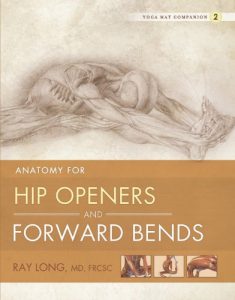As the Chinese proverb states, when you cannot reach an important goal, keep the goal but change your strategy. Yoga poses, like goals, can sometimes be difficult to achieve. What are your options when you cannot attain a posture? You can give up on progressing in the pose or you can change your approach to attain it. Changing strategies requires resourcefulness. Draw on this to break through blockages and safely attain the asanas. The Mat Companion series provides you with these resources in the form of scientific techniques.
Suppose you have tried all of the conventional means to bring your thighs to the floor in Baddha Konasana (Bound Angle Pose). You’ve tried pressing the knees down or placed weights on the legs and still you haven’t progressed. Continued attempts will likely yield little in the way of results. So you decide to change your strategy. You can apply facilitated stretching to lengthen the muscles that are preventing you from going deeper into the pose. In the process, not only will you be able to bring the thighs closer to the floor, but you will also stimulate the nerve receptors in the pelvic region. This will illuminate the first and second chakras and aid to open energetic blockages. In addition, practicing in this way brings a better understanding of the asymmetries in your body. This understanding will carry over into other poses, expanding your overall yoga experience.
Perhaps you have lower back strain in a forward bend. The temptation might be to give up on the pose. Instead, try engaging the abdominals to create reciprocal inhibition of the stretching back muscles. Contracting the abdominals also elicits the abdominal “air bag” effect and supports the lumbar spine. This change in strategy is simple to apply and often works. These are examples of how to combine your knowledge of Western science with the wisdom of Hatha Yoga.
In many ways, practicing yoga is like the work of a native rainmaker who performs a ceremony to release atmospheric tension. Yoga releases physical and spiritual tension. Be resourceful and strategic as you make rain, both as a practitioner and as a teacher.
Suppose you have tried all of the conventional means to bring your thighs to the floor in Baddha Konasana (Bound Angle Pose). You’ve tried pressing the knees down or placed weights on the legs and still you haven’t progressed. Continued attempts will likely yield little in the way of results. So you decide to change your strategy. You can apply facilitated stretching to lengthen the muscles that are preventing you from going deeper into the pose. In the process, not only will you be able to bring the thighs closer to the floor, but you will also stimulate the nerve receptors in the pelvic region. This will illuminate the first and second chakras and aid to open energetic blockages. In addition, practicing in this way brings a better understanding of the asymmetries in your body. This understanding will carry over into other poses, expanding your overall yoga experience.
Perhaps you have lower back strain in a forward bend. The temptation might be to give up on the pose. Instead, try engaging the abdominals to create reciprocal inhibition of the stretching back muscles. Contracting the abdominals also elicits the abdominal “air bag” effect and supports the lumbar spine. This change in strategy is simple to apply and often works. These are examples of how to combine your knowledge of Western science with the wisdom of Hatha Yoga.
In many ways, practicing yoga is like the work of a native rainmaker who performs a ceremony to release atmospheric tension. Yoga releases physical and spiritual tension. Be resourceful and strategic as you make rain, both as a practitioner and as a teacher.






